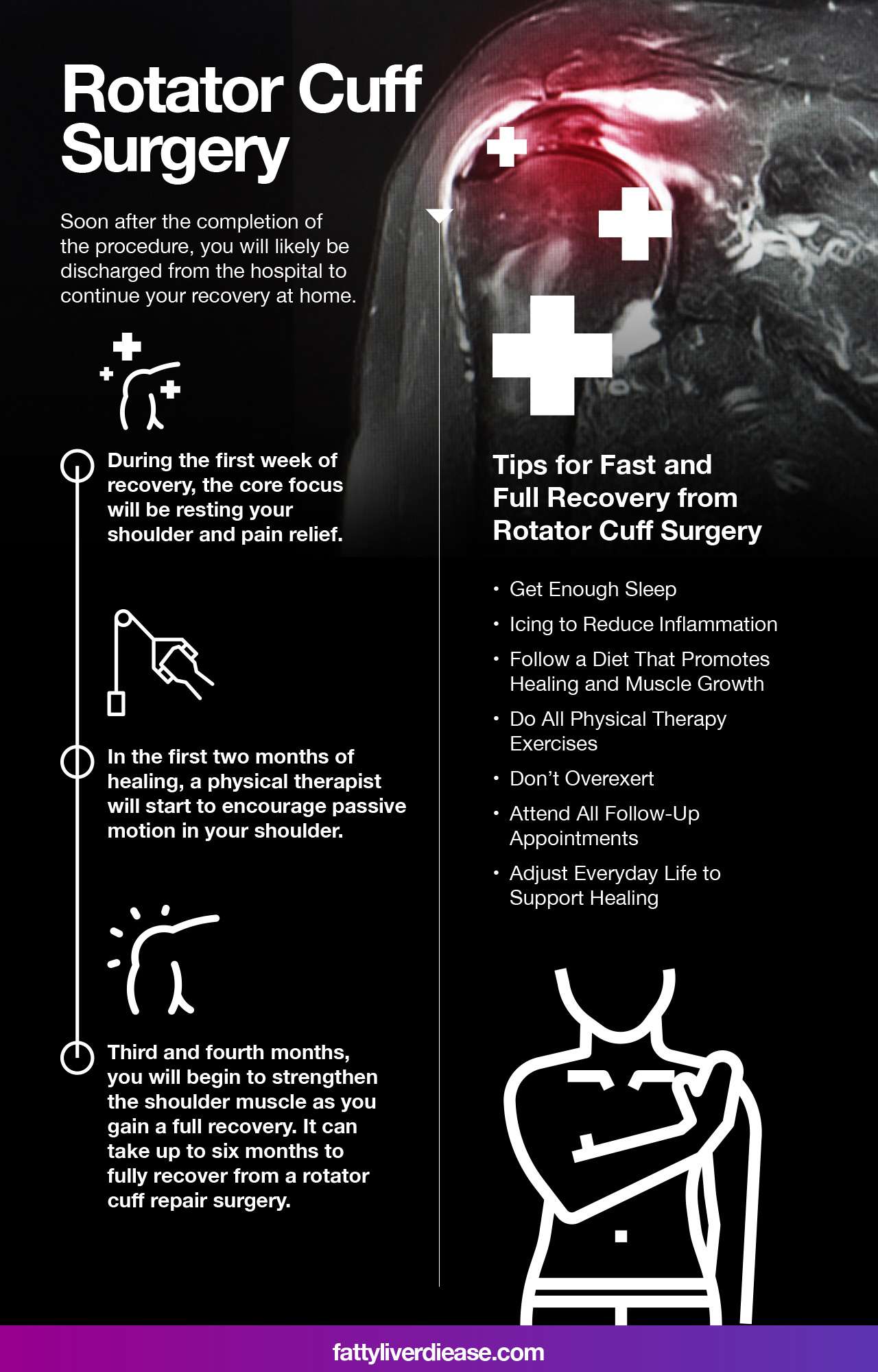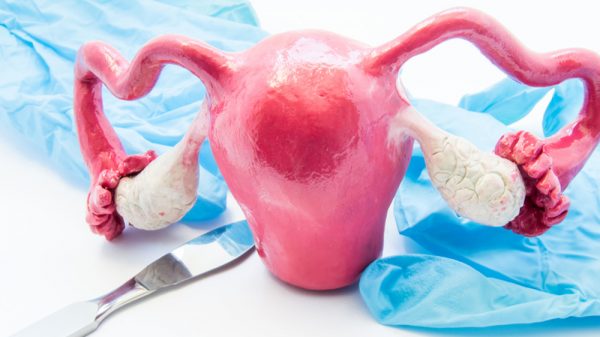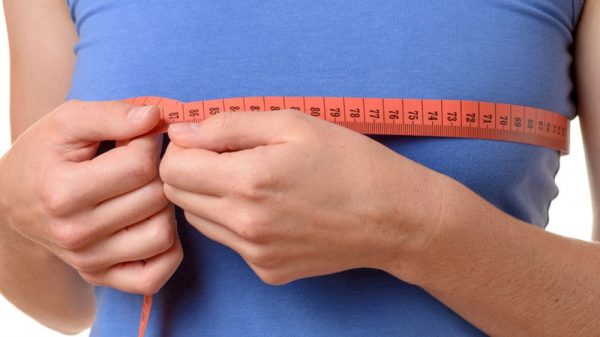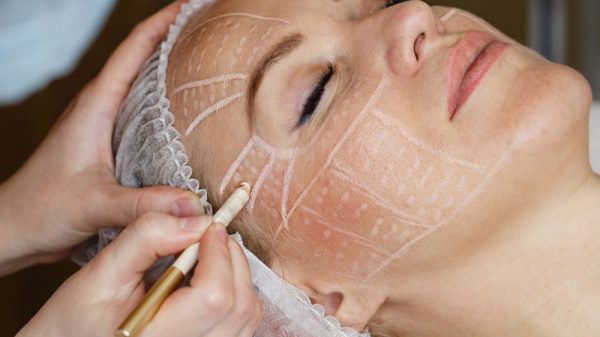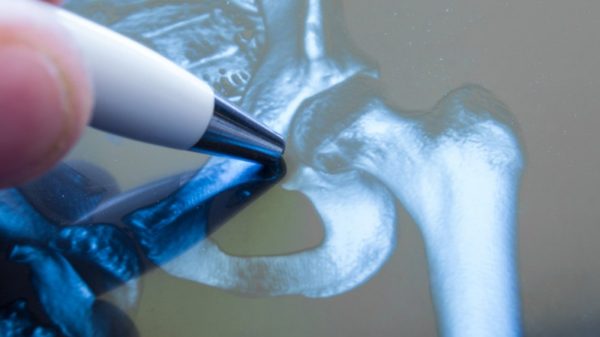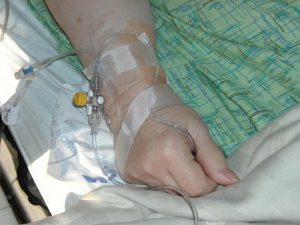If you’ve sustained a shoulder injury, it may be able to heal on its own with rest and nonsurgical treatments. However, some shoulder injuries are beyond what your body can handle, and surgery is the only way to restore function. If you have a rotator cuff injury that causes severe pain and results in significant loss of function, an orthopedic surgeon may recommend rotator cuff surgery.
What can you expect from this procedure, and how can you support a speedy rotator cuff surgery recovery? Keep reading to find out.
Rotator Cuff Repair Surgery: What to Expect
The shoulder is a complex joint where your shoulder blade, arm bone, and collarbone meet. The rotator cuff is a group of muscles and tendons that protect the ball-and-socket configuration of the arm bone and shoulder blade, allowing for the arm to extend in multiple directions without issue.
Several factors increase the risk of developing a shoulder injury that causes a torn rotator cuff.
- Overuse: If you play a sport that requires many overhead motions, such as throwing, you may be vulnerable to an overuse injury. For example, baseball pitchers and tennis players are particularly susceptible to rotator cuff tears. Rotator cuff repair surgeries are extremely common in sports medicine to help athletes regain use of their shoulder and arm.
- Acute injury: Extreme exertion, such as lifting a particularly heavy object, can put so much pressure on the shoulder joint and rotator cuff tendons that it results in a tear. Engaging in strenuous activities you’re not used to can cause such acute injuries. Accidents, such as an unexpected fall or car wreck, can also cause acute injury to the rotator cuff.
- Degenerative tear: Our rotator cuff muscles and tendons lose strength and become weaker as we age. Bone spurs and tendonitis associated with age may significantly weaken the rotator cuff and cause injury.
Symptoms of a Torn Rotator Cuff
If you have a tear in your rotator cuff, you will likely experience:
- Shoulder pain
- Loss of shoulder strength
- Severely impacted ability to conduct daily activities
- Restricted movement
Your physician may first suggest nonsurgical treatment options. However, if shoulder pain and movement restrictions don’t resolve, surgery is the next line of treatment to repair the torn tendon.
Type of Rotator Cuff Surgery
Depending on the extent and nature of your shoulder injury, many surgeons choose to conduct arthroscopic shoulder surgery. Arthroscopic shoulder surgery is minimally invasive and involves inserting a small camera – or arthroscope – into the shoulder area, allowing the surgeon to conduct targeted repairs using small tools.
Alternatively, if the surgeon deems necessary, they will conduct an open surgery that involves making larger incisions and exposing more of the shoulder.
Potential complications of a rotator cuff repair include:
- Infection: As with any surgery, surgical wounds can become infected. Antibiotics are usually administered to help lower the risk of infection.
- Injured nerves: Since surgery requires manipulating tendons and muscles in the shoulder, it is possible that a nerve may be damaged in the surgical procedure.
- Muscle detachment: If you’ve undergone an open surgery, surgeons must detach and reattach the deltoid muscle. This leaves the muscle more susceptible to tearing or detachment during the recovery process.
- Limited range of motion: Recovering from surgery is often accompanied by stiffness.
- Rotator cuff re-injury: Tendon tears and surgery may increase the likelihood of sustaining another tear in the future.
Keep in mind that many surgery side effects, like stiffness or re-injury, can be prevented with proper recovery practices. Serious complications are rare, and the risk of developing complications is slightly elevated with open surgery than with arthroscopy.
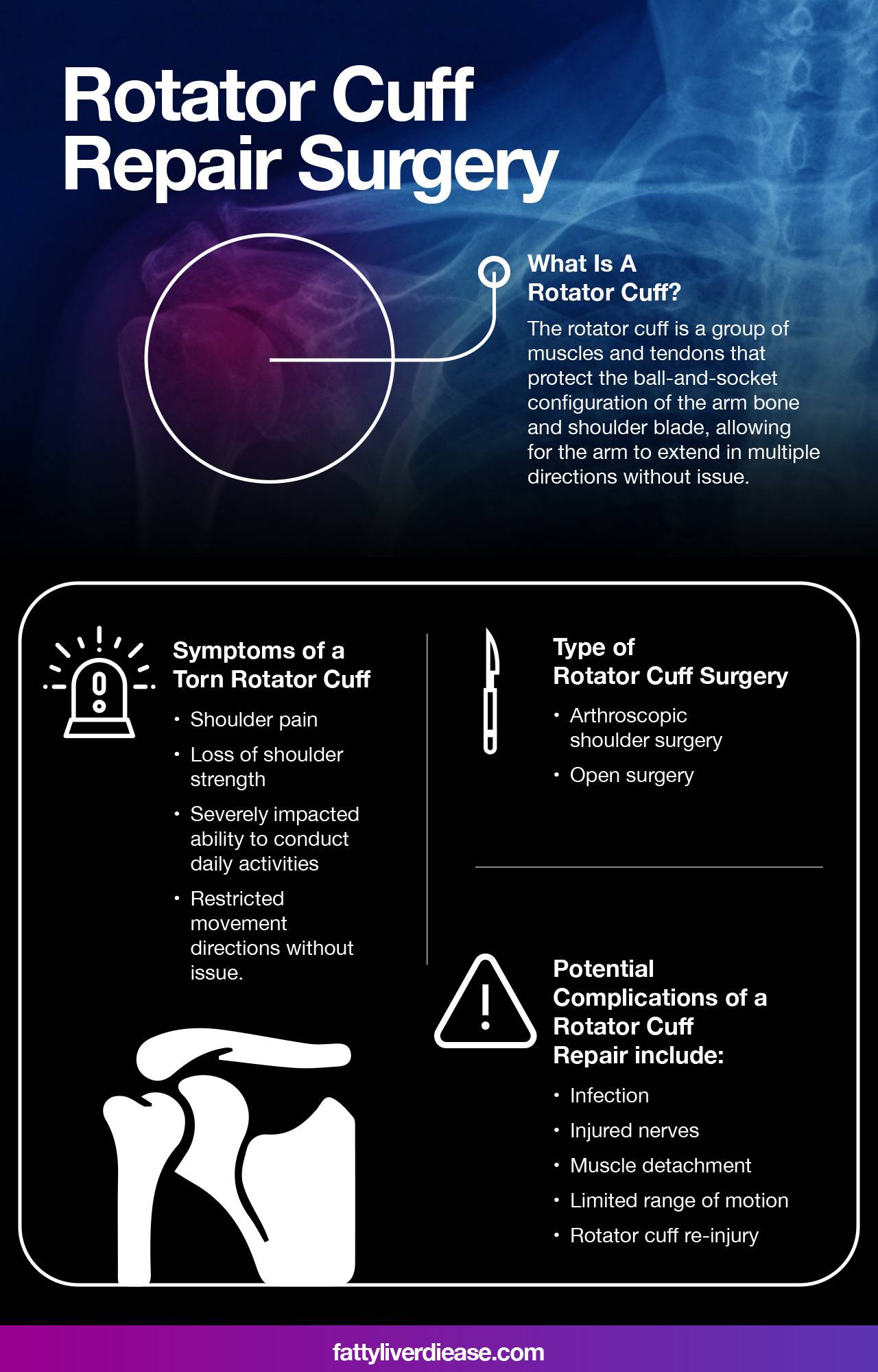
Timeline for Shoulder Surgery Recovery
Though it varies on a case by case basis, the surgery itself generally takes an hour. Soon after the completion of the procedure, you will likely be discharged from the hospital to continue your recovery at home.
You will be sent home in a sling that serves as an immobilizer to keep your shoulder still and hold it in an ideal position to encourage healing. During the first week of recovery, the core focus will be resting your shoulder and pain relief. You may be advised to manage your pain with prescribed painkillers or over-the-counter pain medications like ibuprofen.
In the first two months of healing, a physical therapist will start to encourage passive motion in your shoulder. Passive movement requires no energy input from you.
Throughout the third and fourth months, you will begin to engage in active shoulder motion that requires power from your own muscles. You will begin to strengthen the shoulder muscle as you gain a full recovery. It can take up to six months to fully recover from a rotator cuff repair surgery.
Tips for Making a Fast and Full Recovery from Rotator Cuff Surgery
If you follow these tips, you will be on your way to regaining full use of your shoulder.
1. Get Enough Sleep
Getting adequate sleep is vital for a successful and speedy healing process. However, it can be extremely difficult to get a full, restful night of sleep when your shoulder is restricted to a certain position. Lying down may be nearly impossible for several weeks since by lying down you can risk shifting in a way that injures your shoulder. Experiment with different upright sleeping positions that allow you to sleep comfortably. For example, use pillows to prop yourself up in bed. Memory foam pillows may be particularly helpful in supporting your back. Alternatively, recliners can be useful for supporting all parts of the body while remaining upright and increasing the likelihood that you can sleep comfortably.
Why is sleep so important for rotator cuff surgery recovery? The truth is, sleep is necessary for recovery every day. Everyday functions – walking around, thinking, eating, digesting, etc. – tax the body and produce cellular waste. Each night, the body must repair tissues and organs from routine wear and tear. We all know the feeling of running low on sleep. Sleep deprivation affects our mood, energy, and physical and mental performance. And the truth is, sleep deprivation doesn’t just feel terrible; it is terrible for our health. Sleep deprivation also makes us more susceptible to stress, compromises immune system function, and increases our likelihood of contracting an illness.
If sleep deprivation is detrimental under normal circumstances, you can imagine how harmful it is when your body is trying to recover from a serious injury and surgery, such as a rotator cuff repair procedure. Following surgery, your body will likely send you signals that you need more sleep than usual. For example, you will likely feel very fatigued and weak following a rotator cuff repair. You may feel inclined to take naps, even if you normally wouldn’t be. Know that this is normal. Your body is simply requiring more energy, nutrients, and time to repair your shoulder.
2. Icing to Reduce Inflammation
Many people underestimate the impact of ice in wound repair. Applying ice, when instructed, is crucial for soothing inflammation associated with wound repair. Make sure to follow the instructions of your orthopedic surgeon and apply ice packs when needed.
3. Follow a Diet That Promotes Healing and Muscle Growth
Nutrition tends to be undervalued in the healing process. Eating a diet high in refined sugars, saturated fats, and preservatives will slow down your body’s cellular processes. The result is a state of oxidative stress, which refers to the buildup of cellular waste that inhibits normal functioning. Poor nutrition can also worsen chronic and systemic inflammation, diverting your immune system’s supplies and energy away from the shoulder area, which needs immune system intervention the most.
Similarly, a healthy diet with anti-inflammatory properties expedites the healing process and equips the immune system with everything it needs to support a full recovery.
So, what should you be eating? Here are pillars of a diet that supports a fast and speedy recovery from shoulder surgery:
- Protein: The importance of protein following a rotator cuff surgery cannot be emphasized enough. In particular, optimal ratios of essential amino acids are required to promote the recovery of damaged tendons and muscles in your rotator cuff. Essential amino acids are components of protein that our body requires on a daily basis. Lean meats and low-fat dairy products contain optimal ratios of essential amino acids. Plant-based proteins generally need to be combined throughout the day to meet amino acid requirements. Keep in mind that when the body is repairing and healing from injury or illness, the immune system requires even more essential amino acids than usual. Moreover, if you are an athlete, optimal essential amino acid intake is required to maintain lean muscle mass while at rest. Incorporating an essential amino acid supplement into your diet during the recovery period can help ensure that your body synthesizes strong muscle tissue and tendons.
- Calories: Consuming enough energy during recovery is important to support a full and fast recovery. Being limited in your physical activity doesn’t mean you need to slash your calorie intake. Your immune system and cells are utilizing energy at a rapid rate to repair damaged tissues, so you need more calories than you may think. Make sure that your calories come from high-quality food sources. Your post-surgery diet should include primarily whole foods, including whole grains, beans, nuts, seeds, fruits, vegetables, lean meats, and low-fat dairy.
- Micronutrients: Micronutrients encompass the fiber, vitamins, minerals, and antioxidants found in food. Getting enough soluble and insoluble fiber in your diet promotes gut health and allows beneficial gut bacteria to flourish. These good bacteria produce compounds that help lower inflammation throughout the body. Vitamins and minerals like vitamin C, the B vitamins, and calcium are critical to ensuring that the body’s cellular processes operate as smoothly as possible. These vitamins and minerals and crucial to fortifying tendons, muscle, and bone – all of which are vital to supporting the complete recovery of the rotator cuff. Finally, antioxidants found mainly in fruits and vegetables play an important role in mitigating inflammation and oxidative stress, while supporting the immune system. The antioxidants found in plant-based foods come in the form of polyphenols and carotenoids.
4. Do All Physical Therapy Exercises
Following all physical therapy instructions is absolutely crucial for making a full recovery. Regaining strength in the shoulder muscles and tendons is reliant on physical therapy compliance.
Participating in physical therapy is not only about strength. Complying with physical therapy exercises also promotes flexibility. You will likely be required to practice stretching exercises in addition to practicing strength exercises. Flexibility and strength exercises work synergistically to help promote full function of your rotator cuff and shoulder following surgery.
Focusing on flexibility without strength would weaken the tendons and muscles. Focusing on strength exercises without flexibility training would worsen stiffness and increase the likelihood of re-injuring your rotator cuff.
Depending on your specific case, you may be advised to attend intensive rehab to help restore full function and range of motion for your shoulder.
5. Don’t Overexert
While physical therapy is essential, it’s also important to avoid overexerting yourself before your shoulder is fully recovered. Each step in your physical therapy routine is vital – but don’t push beyond what your orthopedic surgeon and physical therapist have recommended. Doing so may result in tearing, stretching, and further damage to your rotator cuff that elongates recovery time, or worse, requires another surgery.
After you’ve reached a full recovery and are cleared to participate in your usual physical activities, you may need to make a few adjustments to prevent re-injury. For example, switch to lighter equipment, perfect your form, and avoid unnecessary heavy lifting that may strain your shoulder.
6. Attend All Follow-Up Appointments
Each case of rotator cuff tear and repair is unique, depending on the cause of injury, the extent of the injury, and the type of surgery performed. Your surgeon and physical therapist will have the best suggestions for what steps to take, in order to support recovery and repair for your individual case. Make sure to attend all follow-up appointments so you can monitor your progress and make adjustments as needed throughout the healing process.
7. Adjust Everyday Life to Support Healing
Your shoulder will be restricted from certain movements for several months. In the meantime, it’s important to make sure you set up your space to cater to your healing shoulder. For example, it may be helpful to make sure foods, dishes, and utensils are within reach. This will ensure that you won’t need to strain with either arm to get what you need. Wear loose-fitting clothes to allow them to be easily taken on and off, to help prevent straining.
If an activity seems risky or you’re not quite sure if you can complete it without straining, ask for help. It’s better to ask for help in the short term than to require more surgeries and ongoing help in the long term.
Rotator Cuff Surgery Recovery: Conclusion
Rotator cuff repair is a significant surgery that will disrupt many aspects of everyday life for several months. By following a nutritious and anti-inflammatory diet, getting adequate sleep, and following guidelines for physical therapy, you will be able to support a fast and complete rotator cuff surgery recovery.
